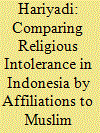| Srl | Item |
| 1 |
ID:
189555


|
|
|
|
|
| Summary/Abstract |
Very few studies explicitly, let alone quantitatively, examine gaps in religious intolerance among individual Muslims based on affiliation with major Muslim organizations in Indonesia. Most existing studies either focus on a single organization (non-comparative), are at the organizational policy level (not examining individual attitudes), or use a limited number of samples in their analysis. Against this backdrop, this study compares Indonesian Muslims’ levels of religious intolerance based on their affiliation with Muslim organizations or traditions: Nahdlatul Ulama (NU), Muhammadiyah, and other organizations. We utilize a large-scale household survey, the 2014 Indonesia Family Life Survey-5, and run an ordinal logistic regression to identify organizations’ rank on the religious intolerance scale. We find that Muslims without any affiliation with a Muslim organization (some 18 percent of Indonesian Muslims) are the most tolerant. Against this reference group, we find that NU followers are generally the most tolerant, followed by those affiliated with Muhammadiyah, and those affiliated with other Muslim organizations. This finding adds a stock of knowledge to our understanding of religion and society, especially regarding interfaith relations in Indonesia and in the Muslim world in general. Methodologically, this study also shows the benefit and feasibility of identifying the dynamic of religious intolerance using a quantitative approach at a micro level.
|
|
|
|
|
|
|
|
|
|
|
|
|
|
|
|
| 2 |
ID:
185753


|
|
|
|
|
| Summary/Abstract |
The phenomenal rise of Hindu nationalism, and the implementation of a series of anti-minority decrees, has raised national and international concerns about the nature and culture of interfaith relations in contemporary India. While Hindu religious identities become increasingly politicized and integrated into nationalist propaganda, some ordinary Indians continue to defy absolute separation between communities. This essay suggests that urban poverty often becomes a context for entangled humanity across lines of faith, as the poor informally use their sacred spaces as arenas for retaining and reviving old and new forms of interreligious coexistence, mutual assistance, and reverence.
|
|
|
|
|
|
|
|
|
|
|
|
|
|
|
|